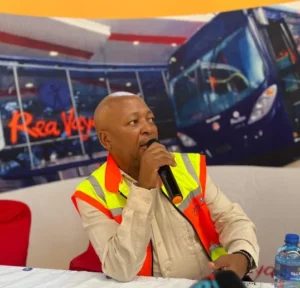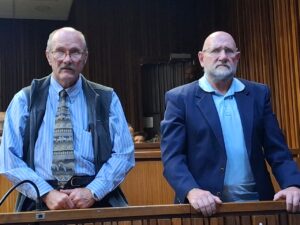By: Arthur Mutambara
The Ideological Bankruptcy and Strategic Incoherence of Cyril Ramaphosa
The State of the Nation Address (SONA) by the President of South Africa is an annual event in which he or she reports on the status of the country and spells out his or her vision. This address is made on the resumption of a joint sitting of Parliament, that is, the National Council of Provinces and the National Assembly.
The presentation marks the opening of the parliamentary year and is usually attended by key political, civic society and governmental figures of South Africa. These include former Presidents, former Ministers, the Chief Justice of the Constitutional Court and other members of the judiciary, Captains of Industry, the Governor of the Reserve Bank, and Ambassadors and Diplomats to the Republic.
This year, on 10 February 2022, President Cyril Ramaphosa presented the SONA address promptly at 7:00pm. He gave a two-hour, wide-ranging speech that covered the economy, national security, anti-corruption efforts, strengthening democracy, and a proposal for a new social compact.
He specifically made a passionate plea for a collective approach to ‘revitalise the economy’ and end SA’s triple challenges of poverty, inequality and unemployment.
There have been various responses to his elaborate SONA presentation, some charitable and others not so affirming, from different sectors and sections of South African society.
However, there is one instructive remark which President Ramaphosa made that throws spanners in the works, detracts from his national vision and undermines his efforts to address the various crises faced by the country:
‘Government Does not Create Jobs, the Private Sector Does.’
This statement exposes Cyril Ramaphosa as ideologically bankrupt and strategically incoherent. He comes across as not fit for purpose.
This is more so because he is President of the ANC, a former liberation movement in a tripartite arrangement with SACP and COSATU.
Furthermore, he presides over the most unequal country in the world (South Africa’s Gini coefficient is 63, the largest number globally) characterised by economic Apartheid and the proverbial triple challenges of poverty, inequality and unemployment.
Why should the State not create jobs in such a country and leave the task to an untransformed Private Sector whose current structure, purpose and history are rooted in Apartheid?
Surely, Ramaphosa’s SONA remarks cannot possibly represent the ANC. It cannot be a view of the SACP. It cannot be a position of COSATU.
Who is he representing?
That is not the language of a party of revolution, the ANC of Chris Hani, Walter Sisulu, Govan Mbeki and Joe Slovo. Those utterances are a clear manifestation of ideological bankruptcy.
For a start, the remark is neither creative nor innovative. It is part of the traditional, unimaginative and unsophisticated trite spewed out by unrepented believers in the Washington consensus – unintelligent worshippers of unbridled market forces.
It is a disgraced primitive slogan – an unashamed embracing and a misguided celebration of undiluted neo-liberalism. Clearly, that slogan has no place in South Africa.
Of course, ‘the key task of government is to create the conditions that will enable the Private Sector – both big and small – to emerge, grow, access new markets, create new products, and hire more employees.’ There is not much disagreement with this postulation, except it is not THE key but ONE of the Government’s key tasks.
Why should the State stop at being an enabler of employment creation? Why can’t the Government also create jobs?
Ramaphosa correctly identifies the objective of building an ‘Ethical, Efficient and Capable Developmental State.’ Surely a developmental state MUST create jobs.
Does he not get it?
This is why we charge him with strategic incoherence.
Can the Government create jobs?
To answer that question, let us start with the history of SA. They say a page of history is worth ten volumes of logic.
The architects of Apartheid were wiser than Ramaphosa. They set up SOEs such as Eskom and Sasol to drive the Apartheid economy and provide jobs for poor and illiterate whites.
More significantly, the Chinese economy, driven by SOEs, is the second-largest in the world and is poised to overtake the United States. Most of the jobs in China are CREATED by the State.
Other excellent examples of job creation by the State include Singapore, Malaysia Rwanda and Norway. Just because the current SA Government has failed to run SOEs while the SOEs are riddled with corruption does not mean the State cannot run businesses and create jobs.
The questions to ask are: ‘How are the Chinese running their SOEs? What can we learn from them? What can we do differently in South Africa.’
Incidentally, the SA Private Sector that Ramaphosa worships as job creators is heavily implicated in the Zondo State Capture Reports. The corruption rot is in both the SA public and private sectors. Job creation is a task for both sectors, and they must work together in pursuit of that ambition.
Obviously, corruption must be rooted out in both sectors, with equal attention and effort.
The Government can create jobs through extensive national infrastructure projects and public works such as roads, bridges, dams, stadiums, railway networks, airports, power stations, schools and hospitals.
The current Build Back Better Framework in the United States is an example of an innovative Government job creation strategy.
Here is what US President Joe Biden has to say:
‘This framework will set the United States on course to meet its climate goals, create millions of good-paying jobs, enable more Americans to join and remain in the labour force, and grow our economy from the bottom up and the middle out.’
This is leadership. Indeed, it is in short supply in South Africa.
When all is said and done, yes, the Government has a pivotal role in creating an enabling environment for businesses, entrepreneurs, innovators, creatives, and inventors to thrive and hence create jobs.
However, an Innovative, Ethical, Efficient and Capable Developmental State can go beyond this primary function and CREATE jobs.
This is of paramount importance in South Africa – a country characterised by economic Apartheid, poverty, inequality, and unemployment. Job creation by the Government is a necessity in South Africa and not a nice to have.
Employment generation is a joint responsibility between Government and the Private Sector. The two sectors must work closely in pursuit of economic growth, economic development and shared economic prosperity.
Cyril Ramaphosa, you are wrong. The Government DOES create jobs. The Government MUST create jobs.
Any position to the contrary is a crude manifestation of ideological bankruptcy and strategic incoherence.
*Arthur Mutambara is former Prime Minister of Zimbabwe








Such a comment from a failed Deputy Prime Minister who masquerades as a Professor is shameful. No former anything from the failed state of Zim can criticise SA which is their lifeline. Without SA and Ramaphosa liniency Zim could be worse than the Sahara desert. So Arthur, shut up.
Francis, I want to agree with you about Mutambara’s personality and not what he says. He is correct. private sector creates jobs enough fro them to make their profits and they cannot create more for everyone to be employed in order to satisfy the national agenda to get rid of poverty, inequality and unemployment. We can argue about this for the next 20 years.
Treasury issues tenders to the value of more than 1 trillion rand annually and that money circulates in the private sector, simply put, the government enable the private sector to create employment for its citizens through that scheme, but what does the private sector do creatively and innovatively to add to that tally created by tenders? The simple answer is nothing.
Reconstruction of SOE is the one way jobs are created by the government but it is the shortsightedness and lack of foresight from the government officials that less people are participating in the economy in terms of employment to eradicate unemployment.
A cleaning tender for one company in the DOH nationally could have up to 2000 employment vacancies, which is where the tender starts and ends, the 20% – 35% profit from this tender by the very company cannot be invested to create another company that will thrive during and after the tender tenure. Simple logic, this person can out of this profit start another company and employ at least another 10 people for other business service different from the cleaning tender, he may as well establish a cleaning chemical manufacturing company to distribute to his other cleaning company colleagues and more.
Clearly the private sector can create more jobs in the enable state tender system than what Cyril was saying, and that to me is creativity and innovation bankruptcy. A regulation could also be created around the tender system that facilitates the creation of employment from the tender profit in failure to do so is fit for disqualification on the current tender. Crunching numbers herein means that more people can be employed from the government enabled tender system than currently is the case. So Cyril is lying.